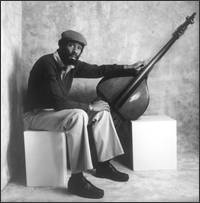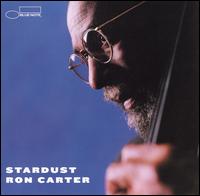

Courtesy of Ron Carter

Blue Note
A FIRESIDE
CHAT WITH RON CARTER
(August
8, 2002)
When
I think elegance and class, not many names come to mind. The list is short
and Ron Carter is on it. Carter has been a favorite of mine since I first
heard him with the now legendary Miles Davis Quintet (quite possibly the
best band in the history of this music). Since I have grown to respect,
not only Carter's sheer musical vocabulary, but also the man. I am honored
to have another moment with Carter, as always unedited and in his own
words.
FRED JUNG: Your latest Blue Note release, Stardust, is a tribute to the
late Oscar Pettiford.
RON
CARTER: Yes, it is Fred. I'm very sorry that I never saw him play live
and what little I've seen have been some pretty old videos whose clarity
isn't really like they can make it today. I've heard great stories about
how he would just come in out of the blue and play this stuff that no
one could imagine could take place on the instrument. I talked with Benny
Golson recently and he told me that he went to this little club in Paris
in the late Fifties and Oscar Pettiford was playing in this maybe two
hundred seat night club on the bandstand all by himself the whole evening
and everyone was just stunned, not that it could be done in it itself,
but that it could be done so completely. So I have great admiration for
anyone who takes on that kind of challenge. Certainly, as a composer,
he's one of the better known unknown composers.
FJ: Benny Golson is featured on the album.
RON
CARTER: Yes, I've known Benny for a very long time. My first meeting with
him was when he was in New York in the process of forming the Jazztet
and I went by his house one afternoon and auditioned for him and he told
me that I was the guy for the job, but my plans, I had just reenrolled
in school for a masters in Manhattan and he said that what I ought to
do is finish school and that we would have plenty of time. It turned out
to be prophetic.
FJ: You have always been a proponent of education.
RON
CARTER: The first thing I tell him is to get a bass teacher. Unfortunately,
bass players are the last guys who think about studying because no one
tells them that it's necessary. Then when they get up some years and have
some gigs under their belt, they realize that they are pretty far behind
everyone else's skill level at that age. They don't read changes or read
them very poorly. They don't read bass parts as complicated as they get
with New York writers. They're kind of the last guys to get on the bandwagon
as far as having their intellectual and educational skills up to par with
everyone else. So my first recommendation to them is to get a good teacher.
And my second thing, is to have them find someone who will sit with the
piano, whether it's in school or a private instruction and learn how the
piano works, learn how the chords look on the keyboard, how to build bass
lines to study composition. I think music is going by really quickly today.
It's going by really fast. There are a lot of guys who are writing a lot
of new things and with the communications the way they are, these communications
can get across the country in the time it takes to put an attachment on
an email. So they've got to really be on top of as many physical possibilities
on their instrument and as many harmonic possibilities as he can come
across through teaching and through taking lessons from teachers as is
possible. I think the days of guys coming up being self-taught are pretty
gone.
FJ: Does the learning process plateau?
RON
CARTER: Absolutely not. The more wonderful players you meet, the more
you know that this is another key to another door that I have to find
out how to open.
FJ: With all the legends you have played with, you must have a lot of
keys.
RON
CARTER: Well (laughing), Fred, I missed a few locks on the way too. It
brings to mind the prison guard walking down the hall with this key chain
that looks about six inches in diameter and enough keys to go into the
locksmith business.
FJ: Having Joe Locke on vibes augments the group sound as well.
RON
CARTER: Yes, well, the vibes have their own kind of quality of course
and I just wanted to get the sound of the band up out of the bass range.
Benny's got a wonderfully dark sound and Roland plays the keyboard with
a warm, dark sound. I thought that the vibes would be a nice way to get
the range of the band up some with the kind of warmth that he has in sound,
it worked out very well. I'm very happy with him and the record.
FJ: As a sitting board member of the Harlem Jazz Music Center, what are
the goals you would like to see come to fruition?
RON
CARTER: To try and play jazz uptown, to make jazz more available, more
accessible with a few courses now and then in the Harlem community. All
of us who work, all of us African-American musicians who work downtown
and in the downtown area would love to go back to Harlem and play as we
did in the Fifties. When I came to New York in 1959, there were eight
really big jazz clubs uptown and they had major talent. I came to New
York, my first night and I went to a place called Count Basie's and I
saw King Curtis and John Coltrane playing at Count Basie's. I went back
the next week and I saw Eddie "Lockjaw" Davis and Shirley Scott.
That's my introduction to New York uptown. We hope that at some point,
Harlem building renaissance, that they will have space and emotional category
to allow some space for a better than antiquate jazz club to be competitive
with clubs downtown so that musicians will look forward to playing uptown
because the conditions are comparable and in some cases better.
FJ: Certainly, the community has embraced it. Has corporate America?
RON
CARTER: Well, they're kind of going whichever way the wind is blowing.
Right now it is going in the hip-hop and rap direction and until that
makes a drastic change in terms of a drop in sales in everything that
rap and hip-hop influences, they won't hop on the bandwagon too quickly.
FJ: Has rap and hip-hop had an adverse effect on improvised music?
RON
CARTER: They've had no effect. What they do if you consider the raw term
of improvising, being able to scratch a record, there are certain rhythms
and being able to find a loop that works, in the purist sense of improvisation,
they have done that in their art form, but I think they haven't helped
the jazz community nor have improvisation skills at all.
FJ: Is jazz fading away to become an American afterthought?
RON
CARTER: As long as there are young players coming up year in and year
out, it will always be here. Right now, it is just 2.5 percent of the
total sales market, which is a pretty minuscule amount when you figure
the pop market and hip-hop and rap market, jazz is not competitive right
now with those record numbers. I play clubs pretty often and concerts
and clubs still sell and the concert halls have maybe one or two seats
left in a one thousand seat hall. So the music will be here forever.
FJ: Do you still have an active interest in classical music?
RON
CARTER: Sure. I don't get to play it much because I am trying to get my
band off the ground or my various groups. I don't have the time that I
had five years ago to be a physical participant, but I certainly sit down
and enjoy listening to music on records.
FJ: Who is in your working band?
RON
CARTER: Stephen Scott playing piano and Steve Kroon playing percussion.
Clubs owners still have a problem with a bass player as a bandleader more
than it is having a flute player up front or a horn player up front. I
spoke to Buster Williams recently and he said he is still confronted with
the issue of how a bass player is going to be a bandleader. Dave Holland
found a solution but his solution is having a horn player and a vibe player
and a trombone player in the band. It is still an emotional problem for
booking agents and at some point when I see these people, I try to invite
them to where the group is working so they can see that not only is it
a wonderfully different sound, but it is financially viable for them as
a booking person. There are new agents that come along everyday and they
haven't had to come across this kind of instrumentation often enough to
know that it works and the older booking agents are older and they're
not doing as much work anymore so the field always changes. Every night
is difficult, Fred. Tonight I am working with Lalo Schifrin and he's celebrating
his seventieth birthday at the Blue Note in New York this week and Ray
Drummond, a wonderful player, has been playing this music since Tuesday
night and my job is to walk in tonight, basically cold, with an hour and
a half rehearsal and make the band sound like I've been there since Tuesday.
The challenges present themselves all the time and what I try to do is
make my presence felt, but make the music still the most important item
on anyone's menu.
FJ: As a teacher, do you find pupils these days have a difficult time
conforming to a supporting role after they've tasted the bandstand as
a leader?
RON
CARTER: Absolutely, no one told, they haven't been in enough bands as
a sideman to know what it takes to function as a sideman. And the leaders
of the groups when they are a sideman are equally inexperienced. So you
have literally the blind leading the blind. It's a problem to show them
what it takes to be a comfortable sideman as it is to be a comfortable
leader because there is not the kinds of formats that were available years
ago that should make that process easier.
FJ: Thankfully, you are still fighting the goof fight.
RON
CARTER: Thank you, Fred.
FJ: How deep is the ocean?
RON
CARTER: (Laughing) It's deep, Fred.
Fred Jung
is the Editor-In-Chief and is the ultimate driving machine. Comments?
Email Him